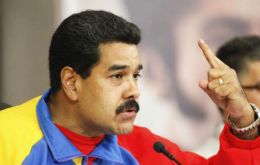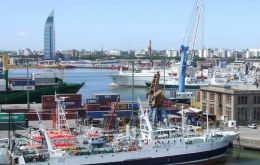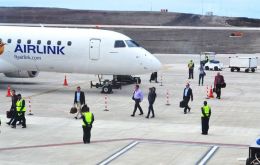MercoPress. South Atlantic News Agency
Economy
-
Saturday, August 26th 2017 - 08:17 UTC
Maduro reacts to Trump's sanctions: “we will sell our oil to other markets”

Venezuela's President Nicolás Maduro has said that a preliminary analysis shows that new financial sanctions imposed by the United States will lead to a halt in oil exports to the US. President Trump's order bans trade in Venezuelan debt and blocks its state oil firm from selling bonds in the US.
-
Friday, August 25th 2017 - 14:24 UTC
“Continued free flow of personal data”, another challenge for Brexit

The UK will seek “new arrangements” with the EU in order to allow for the continued free flow of personal data, according to a government paper. Many UK businesses and law enforcement agencies rely on EU data.
-
Friday, August 25th 2017 - 14:17 UTC
Strong message to trademark infringements in China: New Balance wins case against local shoemakers

New Balance has won a record payout in a Chinese trademark case after three local shoemakers were found to have infringed the brand's “N” logo. A Chinese court awarded the US sportswear firm more than 10 million Yuan (US$1.5m).
-
Friday, August 25th 2017 - 13:13 UTC
Qantas...nonstop flights between Sydney and London in 2022

Australian airline Qantas said it wants to introduce nonstop flights between Sydney and London in 2022 and will choose between Boeing’s new 777-8X and Airbus’ A350-900 to fly this ultra-long-haul route.
-
Friday, August 25th 2017 - 12:11 UTC
Montevideo port operators warn about increase costs' increase and loss of activity

Montevideo port agents and operators have publicly expressed their concern regarding some articles included in the current budget discussions which are contrary to the constitution, labor legislation and will unnecessarily increase costs and have a direct impact on the port's competitiveness.
-
Friday, August 25th 2017 - 09:31 UTC
Brazil opens vast Amazon nature reserve to mining

Brazil stripped a vast Amazon nature reserve of its protected status in a move that could expand mining in the region, in a decree published on Wednesday. The four million-hectare reserve is home to indigenous people but also rich in gold and manganese.
-
Thursday, August 24th 2017 - 07:51 UTC
St Helena hopeful of a regular air link to South Africa following a successful proving flight

The St Helena government, a British Overseas Territory in mid Atlantic has said that a commercial aircraft completed a successful proving flight to the island. The Airlink’s Embraer E190-100IGW departed St Helena Airport on Tuesday afternoon following the main flight from Johannesburg and several flight trials before returning to South Africa.
-
Thursday, August 24th 2017 - 07:16 UTC
Southampton “invaded” by ten cruise vessels, with some 55.000 travelers

Southampton welcomed a £25 million boost to its economy over the weekend as ten cruise ships arrived in the city's port. Some 55,000 passengers were embarked and disembarked, splashing their cash in the city's hotels, restaurants and bars. Each of the ships, was estimated to bring a £2.5million boost to the city's economy.
-
Wednesday, August 23rd 2017 - 09:55 UTC
Temer prepared to privatize one of Brazil's jewels of the crown

Brazil's surprise move to privatize Centrais Eletricas Brasileiras SA sent the utility's shares soaring nearly 50% on Tuesday as investors bet the plan augured further moves to loosen the government's grip on the economy.
-
Wednesday, August 23rd 2017 - 09:32 UTC
Falklands issues coins in recognition of fisheries conservation policies

The government and treasury of the Falkland Islands have issued new coins which recognize 30 years of work conducted by the Falkland Islands Fisheries Department (FIS) to help maintain fish populations around the Islands. FIS, responsible for the sustainable development of fisheries in the Falklands, was established in 1987.
